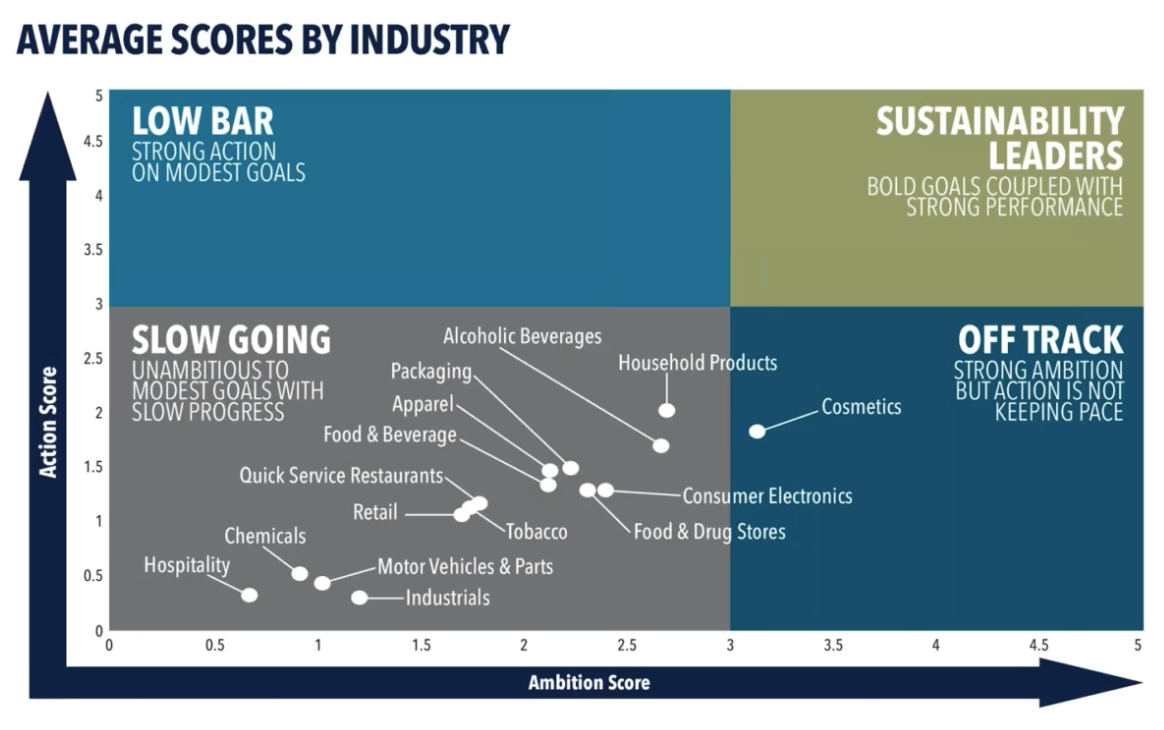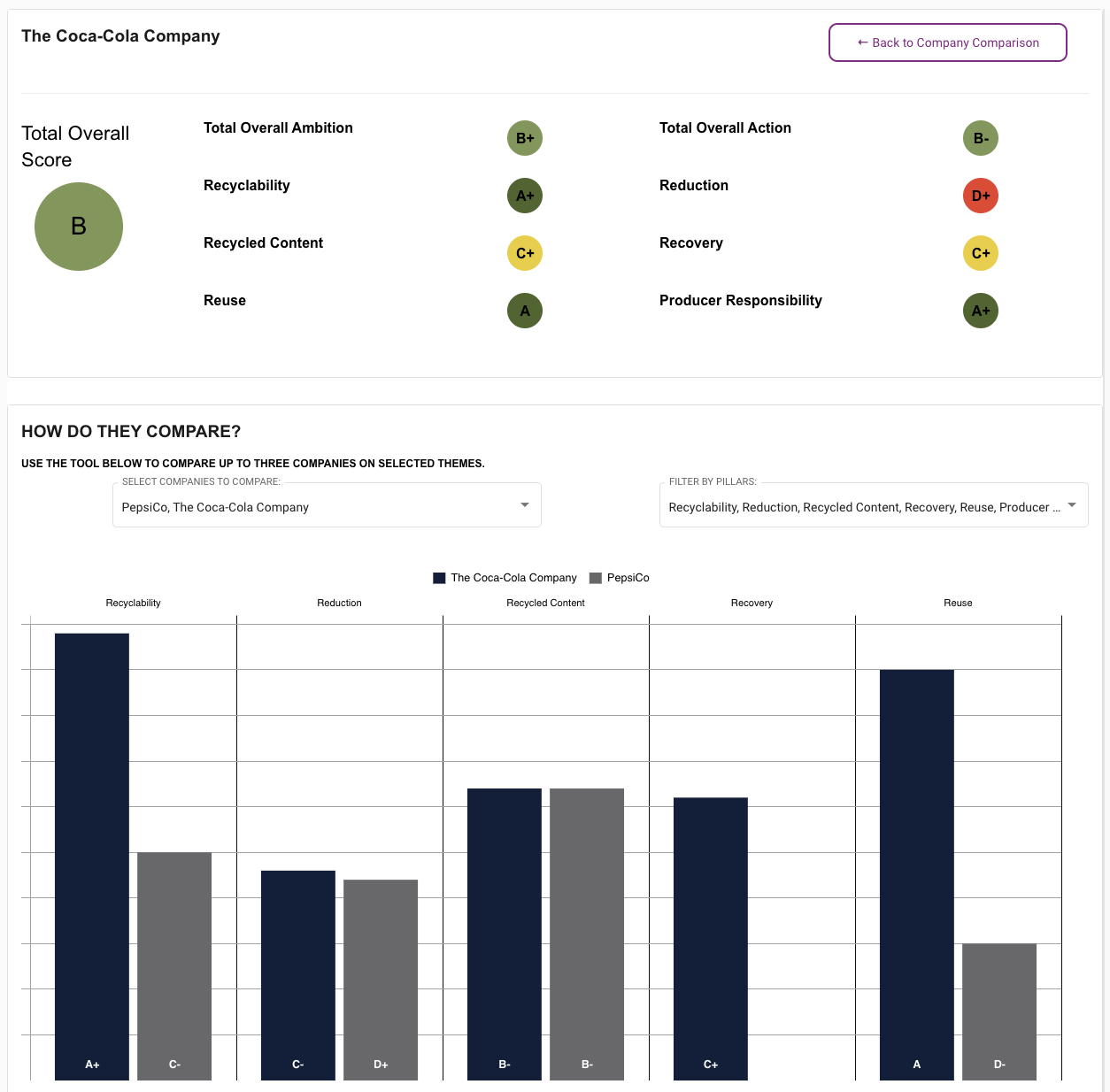Of more than 200 companies with at least $1 billion in annual revenue, none — zero — are doing enough to reduce, reuse and recycle plastics in their products, according to a new report by the shareholder advocacy group As You Sow and Ubuntoo, a consultancy that offers sustainability solutions for large corporations.
The 2024 Plastics Scorecard, published June 12, also alleges that plastic “intensity” is actually increasing — meaning the amount of plastic used to generate each dollar in sales is rising.
The report scrutinized 225 companies across 15 industries, awarding each company a grade on a scale from A to F, depending on their achievements in reducing the amount of plastic they use, improving the recyclability of their products, and reusing post-consumer plastic waste.
None received an A. The most common grade, held by 107 businesses — nearly half — was an F.
There’s a huge difference between recyclability that is in theory or technically recyclable, versus recyclability in practice and at scale.
“Every industry and every company can be doing more on plastics, and should be,” As You Sow’s Circular Economy Manager Kelly McBee said. “We are not on track to take action against this growing threat.”
What grades did they get?
- Fashion house Stella McCartney was the best company on the list with the only B-plus grade.
- The only solid B marks were for The Coca-Cola Co., H&M Group, SC Johnson and Keurig Dr Pepper.
- Only 4 percent of the businesses earned a B-minus or better.
- Among the 46 C grades were Diageo, Starbucks Coffee Company and Natura & Co. Walmart, Nestle and Colgate-Palmolive fared slightly better, each with a C-plus. Apple, Clorox, Mars, McDonald’s and Target had C-minus grades.
- There were 64 D grades. PepsiCo had a D-plus. IKEA earned a D-minus, alongside PFAS makers 3M and Dow.
- 107 companies held Fs, a failing grade, including Amazon, General Mills, Macy’s, Campbell Soup Company and Grupo Bimbo.





What should companies do?
As You Sow, based in Berkeley, California, and Ubuntoo urged companies to take action in six areas:
1. Recyclability
Making products that are actually recyclable was the most common goal, made by 147 companies. But only 22 companies were on track to meet it.
“There’s a huge difference between recyclability that is in theory or technically recyclable, versus recyclability in practice and at scale,” Venky Kidi, Ubuntoo co-founder and report partner, said. Ubuntoo is based in Atlanta, Georgia.
“What that means is companies need to define recyclability — and this is actually done pretty well by the Ellen MacArthur Foundation — in a way that allows consumers to have access to recycling facilities, and a significant portion of consumers should be able to send their packaging back to be recycled and then brought back into the economy,” Kidi said.
2. Reduction
Reducing the total amount of plastic used involves both cutting virgin plastic as well as using less plastic in products and packaging.
Companies that have goals to reduce total plastic usage as well as plastic intensity are the ones getting the highest scores, Kidi said.
3. Recycled content
One-hundred-and-forty-five companies have goals to ramp up recycled content. The report scores companies more highly for prioritizing post-consumer over post-industrial plastic.
“There’s a lot of evidence to show that beverage container deposit schemes tend to improve recycled content availability, which is the single biggest obstacle for companies to get access to recycled material,” Kidi said.
4. Recovery
The most ambitious goal, held by only nine of the companies, is to recover packaging from the environment, Kidi said. Some have committed to 100 percent recovery of post-consumer waste.
5. Reuse
Forty-three companies are exploring reusable packaging in pilots, including in package-free and refillable formats. But these demo projects aren’t making it into everyday business practices, McBee said.
“So one of our recommendations is that companies take the learnings from these reusable pilots and set new goals, make new commitments for how these can be permanent practices,” she said.
6. Extended producer responsibility
in the last five years, 73 companies have issued statements in favor of extended producer responsibility (EPR) laws, which require companies to take responsibility for post-consumer waste, according to McBee. As You Sow and Ubuntoo urged more businesses to join them.
“This could inform the additional passage of more state-level policies here in the U.S., or national policies around the globe, and to align the recycling contributions with plastic use intensity,” McBee said.

![]()
![]()
![]()
![]()
In better news
- Most of the 225 companies have targets for making more plastics recyclable, reducing their use and featuring more recycled material.
- More companies are supporting new regulations for EPR. Federal EPR policy doesn’t exist in the U.S. Minnesota passed the nation’s fifth state EPR law in May.
[Learn how companies are navigating the fast changing sustainability agenda and driving more impact with Trellis Network.]
- SEO Powered Content & PR Distribution. Get Amplified Today.
- PlatoData.Network Vertical Generative Ai. Empower Yourself. Access Here.
- PlatoAiStream. Web3 Intelligence. Knowledge Amplified. Access Here.
- PlatoESG. Carbon, CleanTech, Energy, Environment, Solar, Waste Management. Access Here.
- PlatoHealth. Biotech and Clinical Trials Intelligence. Access Here.
- Source: https://www.greenbiz.com/article/nearly-half-all-1-billion-plus-companies-are-failing-plastics-scorecard

